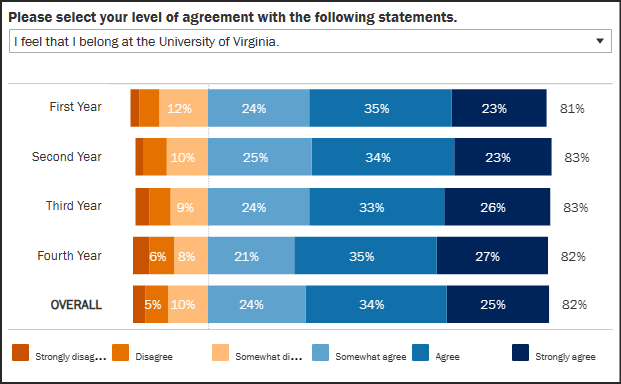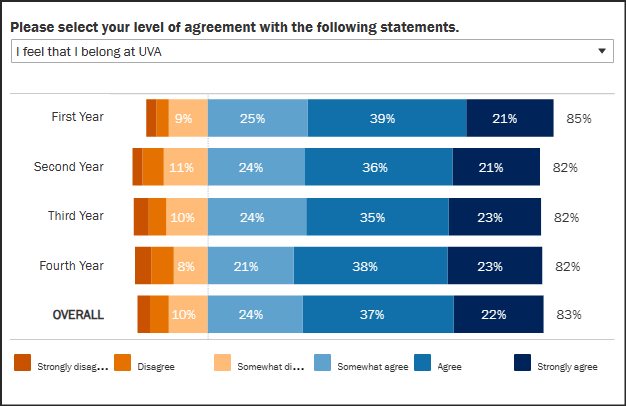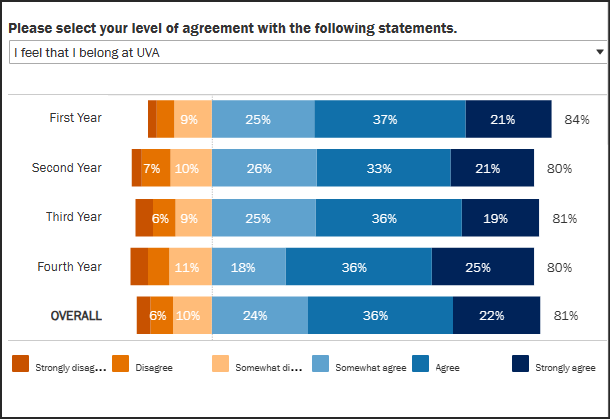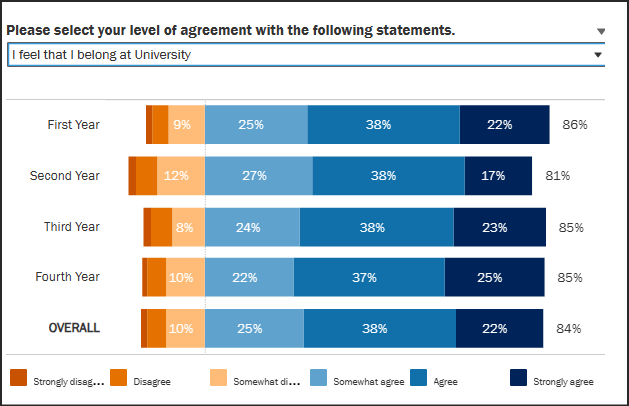 by James A. Bacon
by James A. Bacon
As the University of Virginia Board of Visitors grapples with contentious issues such as equity, inclusion and racial preferences, it could benefit by knowing how well the policies of the Ryan administration have succeeded or failed in making UVa a more welcoming place for students across “every possible dimension” of diversity, to use President Jim Ryan’s words.
The administration possesses considerable data to answer the question. During the final year of the Sullivan administration, 2018, the university conducted a comprehensive, in-depth “campus climate” survey. Since then, the university has participated in biennial surveys conducted under the auspices of the Student Experience in the Research University (SERU) consortium, which, th0ugh less comprehensive than the 2018 effort and fraught with discontinuities in the questions asked, does contain useful information.
The university’s Office of Institutional Research & Analysis posted results for 2022 for public viewing in August. The graphic below summarizes student responses to the statement, “I feel I belong at university.”

Three of five (60%) students agreed or strongly agreed with the sentiment that they belonged at UVa. Seventeen percent expressed various degrees of disagreement.
Is that a good finding or a bad finding? It depends on context.
How do the numbers compare to other universities participating in the SERU survey?
How have the numbers changed? Is the sense of “belonging” improving, diminishing, or about the same?
How are sub-groups faring? In the context of ongoing debate over racial preferences, are the numbers improving for minorities, particularly African-Americans, whom the administration deems victims of systemic racism and to whom its policies are the most solicitous?
Unfortunately, that context is not available in the published SERU data. Institutional Research & Analysis posts “broad survey results” online. Members of the “university community” who believe detailed survey results could “help inform” their work are invited to ask for more detailed data.
Under Ryan, the University of Virginia has undergone profound changes in an effort to become more diverse, more equitable, and more inclusive. The Racial Equity Task Force published a detailed critique of racism at the university and proposed exhaustive remedies. The Board of Visitors endorsed the goals of that task force, and UVa has integrated many of its recommendations into its strategic plan. The administration has removed the names of segregationists from buildings, built a memorial to enslaved laborers, and taken down a statue of Indian fighter George Rogers Clark. UVa has given preferential treatment to Blacks and Hispanics in admissions and has dedicated multimillion-dollar sums to recruiting minority graduate students and faculty members. In day-to-day discourse the administration has embraced the preoccupations and rhetoric of the leftist social-justice movement.
How has that worked out? Some might hope that this lurch to the left has succeeded at what it set out to do — to make UVa more welcoming to African-Americans. Conversely, observers who dispute the assumptions of the “anti-racism” crusade might argue that nurturing minority grievance and victimhood might make African-Americans feel more alienated.
It is worth asking whether African-Americans feel more included. We cannot take it for granted that they do. Kevin McDonald, UVa’s chief diversity officer, made the remarkable statement in the June Board of Visitors meeting that the sense of belonging of UVa’s Black students has gone down over the past several years.
McDonald apparently possesses data that have not been made available to the public. His statement is impossible to verify from the SERU results posted online.
One reason that it is difficult for the public to draw conclusions is the fact that some survey questions have changed over time. Another is that the Institute of Research & Analysis reports the sentiments of the student body overall, not of different racial groups. African-American students may have different perceptions than other students but, comprising only 7% of the student body, their responses can be drowned in the overall findings.
Given those caveats, let’s see what the data tell us. The following three graphs show the percentage of students, in surveys eliciting between 3,200 to 3,800 responses, who feel they “belong” at the university in 2016, 2018, 2020, and 2022.




To summarize the bottom-line results:
2016 — 18% of students overall felt to a varying degree that they did not belong.
2018 — 18% of students overall felt to a varying degree that they did not belong.
2020 — 19% of students overall felt to a varying degree that they did not belong.
2022 — 17% of students overall felt to a varying degree that they did not belong.
Over the six-year period there has been an incremental gain in the sense of “belonging” for the overall student body from a mean score of 4.54 to 4.58 on a six-point scale. Whether African-Americans share the overall perception is an open question.
Given how central the issue of “belonging” is to evaluating the effectiveness of Ryan administration policies, the Board of Visitors would be well-advised to ask for the data Kevin McDonald was referring to. Designers of the Institutional Research & Analysis climate surveys should be invited to share their analysis with the Board.

Leave a Reply
You must be logged in to post a comment.